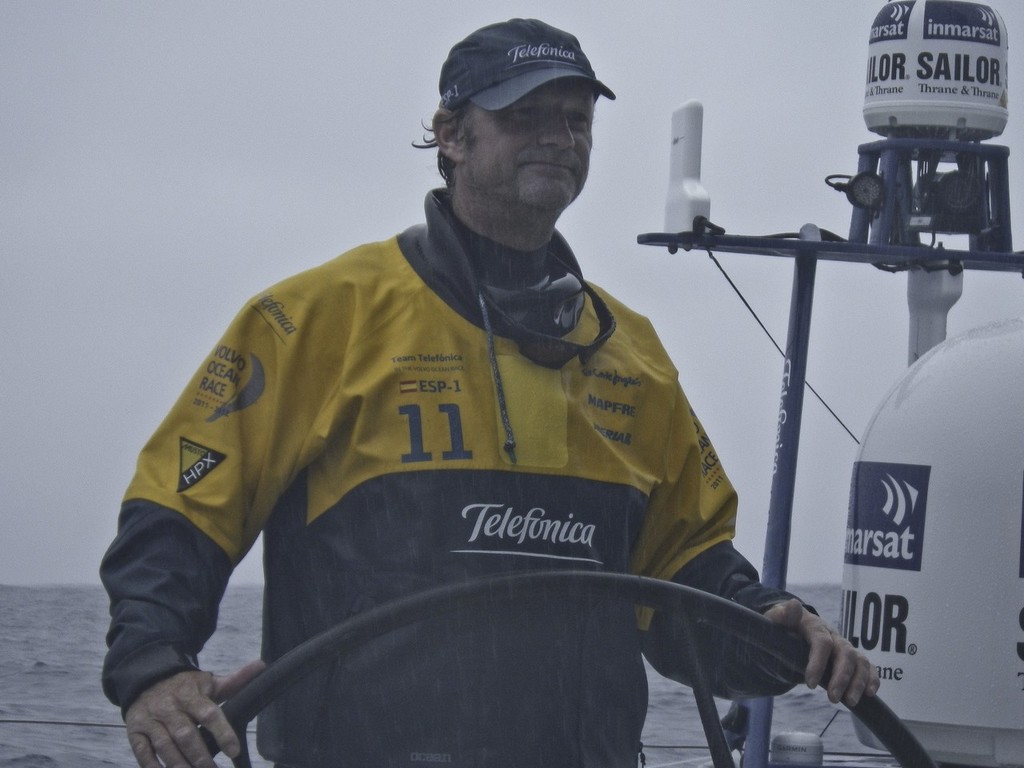Volvo Ocean Race- Neal McDonald - It's going down to the wire
by Volvo Ocean Race on 8 Jun 2012

Neal McDonald helming Team Telefonica during leg 2 of the Volvo Ocean Race 2011-12, from Cape Town, South Africa to Abu Dhabi, UAE. Diego Fructuoso /Team Telefónica/Volvo Ocean Race
http://www.volvooceanrace.com
With just two legs and three in-port races to go, four teams are still in the running for the overall prize. Volvo Ocean Race's media team talk to some of the most experienced contenders as they prepare for the decisive final few weeks. First up: Neal McDonald of Team Telefónica.
We're officially calling this the Closest Volvo Ocean Race Ever. How vital are the points now?
I think this race will go down to the wire for sure. I’d be very surprised if this race is concluded before the end of the last leg and maybe even the end of the last inshore. It’s close enough that it could fall four ways. For us it’s like starting afresh. It’s almost like a short race deciding a long race, and that’s fine for us because we have the equipment to battle it out, but it feels strange to end a nine-month race and a three-year campaign in the final month.
The In-Port Race series could make all the difference to the final outcome. What are your thoughts on the inshores?
It’s not so much that we didn’t train for the in-port races, we just didn’t focus our boat so much on them. Our boat isn’t set up as well for the in-ports as some of the others, and that’s just a fact of life. That was a trade-off we made a long time ago, and I still think it was the right one to make. Even now, when you look at the points on the table, there are 60 points left in the offshores but only 18 in the inshores. For my money, I still think we went the right way focusing on the offshores. It’s not a crew training thing, it’s just the boat is set up with the offshores in mind, and we go into the in-port races with a small disadvantage. It’s harder for us to win an in-port than some of the other boats – it’s just the way the boats are set up.
What's going to be the decisive factor in determining this race?
In the past, preparation is what has won the race. People will say it’s money, and preparation does cost money, but it’s the time to prepare that counts. We were fortunate to have that time and we did a lot of good preparatory work. That in the past has been a very big part of it, but with this race being so close, it’s clear that it’s not just the boat speed and the set-up – the people have to be top notch too. We’re surrounded by good sailors on every boat. There’s not a boat out there that doesn’t have world champions on board. For me the people have become more important than the boats. You need a fast boat but you need good sailors too – end of story.
How do you see the last two offshore legs going?
Although they’re short these last two legs will still be a long, drawn-out process. Even a 500-mile race will feel full of hard yards. It’s about keeping the energy going, keeping that drive so everyone’s on top form all the time. It’s impossible to be 100 per cent all the time, and you have to focus yourself on the times when you have to give your all. That’s the balance that’s difficult to get. To start this race you need a certain mentality that drives you to the very end. We’re all sportsmen, we’re not here just to have an adventure or to get our kicks. It’s the sport that drives us and we want to win. It would be very easy to get to Galway and not break into a sweat but you’d be last by a week. I don’t think anyone in this game, at this level, is in that frame of mind. We’ve got this far – it’s been three years of hard work, of making sacrifices – and the only thing that drives us now is the potential of winning. I don’t think you’d even start the race if you didn’t think like that.
You lost your long-held lead to Groupama after the last leg. How much of a blow was that?
I don’t think it changes anything. I’m surrounded by Olympic gold medallists, America’s Cup winners, by people who’ve won all sorts of world class events, and these guys know exactly what it’s like. Yes, we're three points behind now, and that hurts. We’re sportsmen and it hurt us, but it’s only one place in an offshore. We don’t have to turn over the world to retrieve those points. We’ve clearly not made it any easier for ourselves but it’s not something we’re going to cry about.
Did you ever think the race would be so close?
One of the good things about a class rule that is three generations old now is that the boats become closer. The very fact that there’s three boats from the same designer meant we were very aware from the start that it was going to be a very tight race. It’s no great surprise. We’ve now finished four legs within minutes of other boats rather than hours, and I don’t think any of us would have predicted that. I actually think that if we didn’t have three-hourly position reports the boats wouldn't be as close as they are. I’ve thought about it a fair bit and I think if you made the position reporting less regular you’d see a very different result.
If you want to link to this article then please use this URL: www.sail-world.com/98191